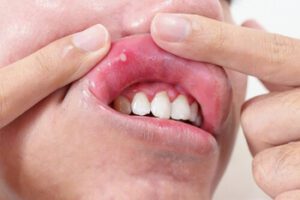Have you woken up with a throbbing tooth and a swollen cheek staring back at you in the mirror? You’re not alone. It’s not just a minor issue you should shrug off. A swollen cheek from toothache symptoms isn’t only uncomfortable but can also be a red flag for something far more serious brewing beneath the surface.
In this guide, we’ll break down what’s really going on when your face swells from a toothache, what you should never ignore, and when it’s time to stop Googling and start seeing your dentist.
What’s Causing Your Cheek to Swell?
Swelling in the face, especially the cheek, is often caused by an underlying dental issue. Here are some of the most common culprits:
1. Tooth Abscess or Abscessed Tooth
A tooth abscess is a pocket of pus that develops due to a bacterial infection, usually at the tooth root. It’s your body’s way of responding to an infection that’s trying to spread. The result? A painful, swollen cheek may also have sore lymph nodes, fever, or even trouble breathing.
2. Untreated Dental Cavity
A small dental cavity might seem harmless, but when left untreated, it can evolve into a potentially life-threatening complication. The infection can extend beyond the tooth to nearby tissues, causing noticeable facial swelling or even a swollen face.
3. Previous Dental Work
Sometimes, previous dental work, like a filling or crown, can harbour bacteria if it becomes loose or damaged, leading to infection and swelling. This is why staying on top of your dental treatment plan is essential.
4. Gum Disease
Chronic gum disease (also known as periodontitis) weakens the supporting structures of your teeth and allows bacteria to travel deep into the gums. It may contribute to cheek swelling, jaw pain, and even jaw tension if it spreads.
Key Symptoms You Shouldn’t Ignore
 Some signs are your body’s way of shouting for help. Pay attention if you experience any of the following:
Some signs are your body’s way of shouting for help. Pay attention if you experience any of the following:
- Constant toothache sensitivity that doesn’t go away
- Swelling in your cheek, jaw, or neck area
- A bad taste or foul-tasting discharge from the affected area
- Sore lymph nodes under your jaw
- Fever or chills
- Trouble breathing or swallowing (this could signal a severe allergic reaction or spreading infection)
These symptoms indicate a dental emergency. If you experience one or more, you need to make an emergency appointment with your dentist immediately.
What to Do at Home Before You See the Dentist
While waiting to receive professional treatment, there are a few home remedies that can help relieve discomfort and slow the spread of infection:
1. Apply a Cold Compress or Ice Pack
Apply an ice pack or cold compress wrapped in a cloth to the affected area for 15-20 minutes. This can help minimise swelling and provide some pain relief.
2. Drink Water, Lots of It
Keeping yourself well-hydrated supports your body’s ability to fight infection and reduces the impact of a high-salt diet, which may worsen inflammation.
3. Use Fluoride Toothpaste
Brushing with fluoride toothpaste helps remove plaque and bacteria, supporting your oral hygiene while you wait for your dental treatment.
4. Avoid Aggravating the Area
Don’t poke at the swollen area or try to drain it yourself. This can spread the infection or make things worse.
Important: These steps are not a cure but a temporary way to ease discomfort until you get professional treatment.
When Is It Time to See the Dentist?
If you’re experiencing a swollen cheek from a toothache, that is your sign. Don’t wait for the last symptom or hope it’ll just go away. Seeking professional treatment promptly can prevent complications such as:
- Tooth loss
- Spread of infection to other parts of the body
- Permanent nerve damage
- Hospitalisation due to potentially life-threatening complications
Your medical history also plays a role. For example, if you have diabetes or a weakened immune system, you’re at higher risk for fast-spreading infections.
The Role of Dental Treatment in Preventing Swelling
Most dental problems leading to facial swelling are avoidable with the right care. Here’s how dental treatment steps in:
 Drainage of Abscess
Drainage of Abscess
For a dental abscess, your dentist may drain the pus to relieve pressure and stop the infection from spreading.
Root Canal or Extraction
If a tooth is abscessed, your dentist might perform a root canal therapy to clean the infected pulp or remove the tooth altogether.
Antibiotics
A course of antibiotics is often prescribed to treat the underlying bacterial infection, but remember, this is only a temporary fix without proper dental follow-up.
How to Prevent a Swollen Cheek in the Future
Nobody wants a repeat episode of facial swelling, so here are steps you can take to protect yourself:
Brush and Floss Daily
Prevent plaque build-up and gum irritation by maintaining a consistent oral hygiene routine. Use fluoride toothpaste, and don’t skip the floss!
Regular Check-ups
Routine dental check-ups catch issues early before they spiral into dental emergencies. Don’t wait until something hurts.
Watch Your Diet
Limit sugar and avoid a high-salt diet. These contribute to cavities and gum inflammation.
Don’t Ignore the Small Stuff
A little toothache or minor discomfort today can evolve into a serious problem tomorrow, like a swollen cheek, infection, or worse.
Final Thoughts: Don’t Take That Swollen Cheek Lightly
A swollen cheek from a toothache might start out as a minor irritation, but it often signals a deeper issue like a dental abscess, an untreated cavity, or gum disease. And if there’s swelling, pain, or a bad taste in your mouth, your body’s giving you a wake-up call.
You don’t need to suffer in silence or rely on temporary home remedies. An emergency appointment with your dentist can make all the difference, both for your comfort and your overall health.
 Quick Tips at a Glance:
Quick Tips at a Glance:
- Don’t delay seeking professional treatment
- Use a cold compress for short-term relief
- Stay hydrated and use fluoride toothpaste
- Book an emergency appointment if symptoms worsen
- Maintain regular dental visits and good hygiene
If you’re experiencing cheek swelling, facial pain, or any signs of infection, don’t wait. Book an appointment with Definitive Dental at (02) 6105 9833 today; it could save your smile and your health, as well as a whole lot of future pain.
Note: Any surgical or invasive procedure carries risks. Before proceeding, you should seek a second opinion from an appropriately qualified health practitioner.
References
- Oral-B. (n.d.). Bad taste in mouth: Causes, remedy & prevention. https://www.oralb.co.uk/en-gb/oral-health/conditions/other-oral-health-conditions/bad-taste-in-mouth-causes-remedy-prevention
- Cleveland Clinic. (n.d.). Root canal. https://my.clevelandclinic.org/health/treatments/21759-root-canal
- Mandal, A. (n.d.). Fluoride toothpaste: What to know. Medical News Today. https://www.medicalnewstoday.com/articles/fluoride-toothpaste

